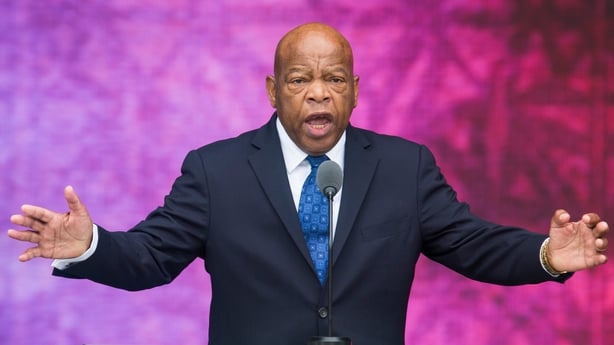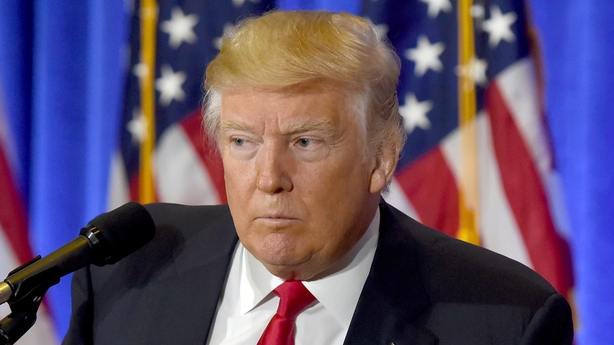US civil rights activists vowed today to defend hard-fought gains in voting rights and criminal justice during the presidency of Donald Trump, kicking off a week of protests ahead of his inauguration.
Chanting "no justice, no peace," about 2,000, mostly black, protesters marched along the National Mall toward the Martin Luther King Jr. Memorial, about 3km from the steps of the US Capitol, where Mr Trump will be sworn in as president on Friday.
Protesters braved temperatures just above freezing to show their support for minority rights and US President Barack Obama's signature healthcare law, which Mr Trump has vowed to dismantle.
The Rev. Al Sharpton, the rally's organiser and a veteran civil rights leader, said Democrats in Congress needed to be sent a simple message: "Get some backbone."
The rally drew fewer people than organisers had initially expected, but Rev. Sharpton said afterwards he was satisfied with the turnout, given the bad weather.
The march came hours after Mr Trump blasted US Representative John Lewis (below) after the Georgia Democrat and civil rights campaigner said he did not see Mr Trump as a legitimate president.

Mr Lewis told NBC News in an interview for Sunday's Meet the Press that he believed Russia's alleged hacking aimed at helping Mr Trump put his legitimacy into question.
Mr Trump replied on Twitter today that Mr Lewis should focus instead on his Atlanta district. "All talk, talk, talk - no action or results! Sad!," he wrote.
Congressman John Lewis should spend more time on fixing and helping his district, which is in horrible shape and falling apart (not to......
— Donald J. Trump (@realDonaldTrump) January 14, 2017
Meanwhile, Mr Trump has hinted that he may lift sanctions on Russia.
Mr Trump told The Wall Street Journal that he would keep intact "at least for a period of time" sanctions President Barack Obama's administration imposed on Russia last month over Moscow's alleged cyber attacks to influence the US election.
However if Russia helps the US on key goals, such as fighting violent extremists, Mr Trump suggested he may scrap the punitive measures altogether.
He also said he was prepared to meet Russian President Vladimir Putin after taking office.

Mr Trump, who sees an opportunity to cooperate with Moscow in fighting jihadist groups such as the so-called Islamic State group, has expressed admiration for Mr Putin.
He only reluctantly accepted US intelligence's conclusion that Russian hackers, acting on Mr Putin's authority, interfered in the US elections.
On the longstanding US practice of not recognising Taiwan diplomatically, Mr Trump said: "Everything is under negotiation, including One China."
Mr Trump has already irked China by accepting a congratulatory phone call from Taiwan's President Tsai Ing-Wen after he won the election, upending decades of diplomatic precedent in which the White House has foregone direct communication with the island's leader.
He defended that move in his interview with the Journal, saying: "We sold them $2 billion of military equipment last year.
"We can sell them $2 billion of the latest and greatest military equipment but we're not allowed to accept a phone call.
"First of all, it would have been very rude not to accept the phone call."
Beijing considers the island to be a breakaway province to be brought back within its fold, by force if necessary.
Mr Trump has threatened to get tough with what he sees as unfair Chinese trade practices, and suggested that the "One China" policy could become a bargaining chip in other disputes.
US committee to probe spying allegations
We need your consent to load this rte-player contentWe use rte-player to manage extra content that can set cookies on your device and collect data about your activity. Please review their details and accept them to load the content.Manage Preferences
The US Senate Intelligence Committee yesterday announced a probe into Russian spying.
It said US intelligence reports of Moscow's interference in the 2016 election and possible ties to US parties "raise profound concerns".
The probe, supported by both Democrats and Republicans on the panel, could see officials of both Mr Obama's outgoing administration and the incoming government of Mr Trump forced to testify.
US intelligence agencies allege that Mr Putin ordered a covert effort to interfere in the election to boost Mr Trump and harm his opponent, Democrat Hillary Clinton.
A report from the Director of National Intelligence, released on 6 January, said the Russians hacked Democratic Party computers and accounts to release files embarrassing to Mrs Clinton, and also conducted a campaign of media manipulation with the same aim.
But the public version of the report was questioned for offering only weak evidence of its claims.

